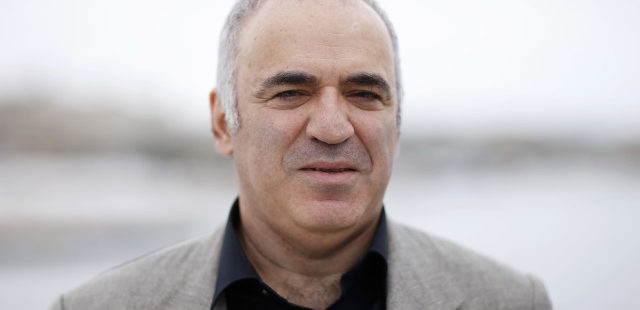

“Terrorist regimes should be isolated, and their leaders treated like the criminals they are,” said Kasparov. “This is how we can support the people, the victims of these regimes. The U.S. is repeating a terrible mistake by negotiating with the leaders of Iran in Vienna.” (2/4)
— Renew Democracy Initiative (@Renew_Democracy) July 27, 2021
READ THE ORIGINAL ARTICLE AT THE JERUSALEM POST
By Benjamin Weinthal
Legendary chess player Garry Kasparov, one of the greats of the game, has urged the US government to pull the plug on nuclear negotiations with Iran’s hardline Islamist regime because it is a dictatorship.
“Terror regimes should be isolated and their leaders should be treated like the criminals they are,” Kasparov said. “That is how can you support the people and the victims of these regimes. Instead, the United States is repeating a terrible mistake by negotiating with Iran’s leaders in Vienna. These negotiations are a waste of time except for Iran’s leaders.”
The former chess world champion said the talks in Vienna “only benefit Iran. They [Iranian leaders] are also buying time to pursue the world’s deadliest weapons.”
Israel and some Western countries have accused Iran’s regime of seeking to build, as well as secure technology for, a nuclear weapon.
The US and other world powers are negotiating with Islamic Republic to bring it back to the 2015 nuclear deal. The atomic pact, formally known as the Joint Comprehensive Plan of Action (JCPOA), offers Iran’s regime sanctions relief in exchange for it abiding by temporary restrictions on is nuclear program.
Kasparov, who is the chairman of the Human Rights Foundation, an organization devoted to democracy promotion and combating totalitarian regimes such as Vladimir Putin’s Russian administration, called Iran an “illegitimate regime” that has no “authority from the people.”
He added that the it causes “terror and war” and “no one suffers more than citizens of the regime.”
The chess grandmaster, one of the greatest players in the history of the game, said Iran’s regime is a “dictatorship, it fears its people. It oppresses and tortures them. Iran is its people.”
He also took the regime to task for its 1988 massacre of Iranian dissidents in prisons, noting there “has been no justice for victims and their families and no accountability.”
Kasparov advocated a maximum pressure campaign against the clerical regime.
The Jerusalem Post reported on the alleged role of Ohio-based Oberlin College professor Mohammad Jafar Mahallati, who Amnesty International said carried out crimes against humanity while serving as the Iranian regime’s ambassador to the UN. Amnesty accused him of covering up the mass murder of 1988.
After the Post revealed that Mahallati urged, during his tenure at the UN, the destruction of the Jewish state and launched tirades against the persecuted Baháí religious minority, Oberlin College’s David Hertz said the institution had launched an investigation into the allegations against Mahallati. Hertz announced the investigation in April but the college has not disclosed what emerged from its inquiry.
The Iranian regime’s new president, Ebrahim Raisi, was involved in the 1988 massacre, according to the US and Amnesty International. Kasparov said “Raisi was not really elected. The word election is a joke in dictatorships like in Iran and Russia. He was chosen to play a role.”

